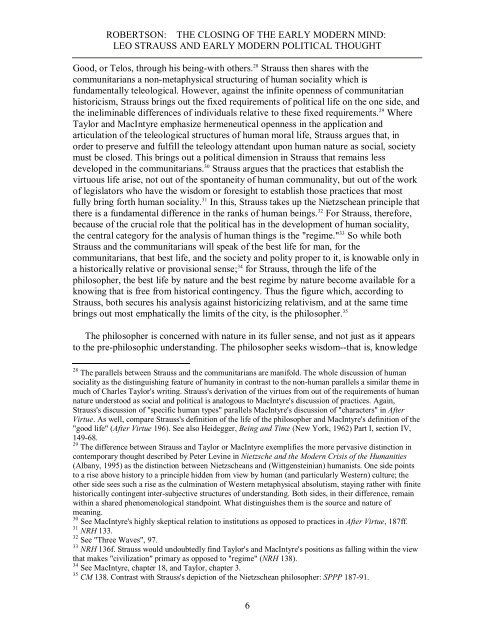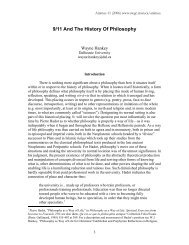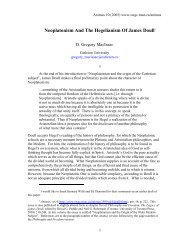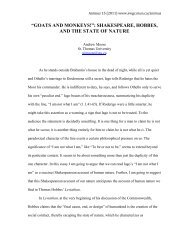Leo Strauss And Early Modern Political Thought
Leo Strauss And Early Modern Political Thought
Leo Strauss And Early Modern Political Thought
Create successful ePaper yourself
Turn your PDF publications into a flip-book with our unique Google optimized e-Paper software.
ROBERTSON: THE CLOSING OF THE EARLY MODERN MIND:LEO STRAUSS AND EARLY MODERN POLITICAL THOUGHTGood, or Telos, through his being-with others. 28 <strong>Strauss</strong> then shares with thecommunitarians a non-metaphysical structuring of human sociality which isfundamentally teleological. However, against the infinite openness of communitarianhistoricism, <strong>Strauss</strong> brings out the fixed requirements of political life on the one side, andthe ineliminable differences of individuals relative to these fixed requirements. 29 WhereTaylor and MacIntyre emphasize hermeneutical openness in the application andarticulation of the teleological structures of human moral life, <strong>Strauss</strong> argues that, inorder to preserve and fulfill the teleology attendant upon human nature as social, societymust be closed. This brings out a political dimension in <strong>Strauss</strong> that remains lessdeveloped in the communitarians. 30 <strong>Strauss</strong> argues that the practices that establish thevirtuous life arise, not out of the spontaneity of human communality, but out of the workof legislators who have the wisdom or foresight to establish those practices that mostfully bring forth human sociality. 31 In this, <strong>Strauss</strong> takes up the Nietzschean principle thatthere is a fundamental difference in the ranks of human beings. 32 For <strong>Strauss</strong>, therefore,because of the crucial role that the political has in the development of human sociality,the central category for the analysis of human things is the "regime." 33 So while both<strong>Strauss</strong> and the communitarians will speak of the best life for man, for thecommunitarians, that best life, and the society and polity proper to it, is knowable only ina historically relative or provisional sense; 34 for <strong>Strauss</strong>, through the life of thephilosopher, the best life by nature and the best regime by nature become available for aknowing that is free from historical contingency. Thus the figure which, according to<strong>Strauss</strong>, both secures his analysis against historicizing relativism, and at the same timebrings out most emphatically the limits of the city, is the philosopher. 35The philosopher is concerned with nature in its fuller sense, and not just as it appearsto the pre-philosophic understanding. The philosopher seeks wisdom--that is, knowledge28 The parallels between <strong>Strauss</strong> and the communitarians are manifold. The whole discussion of humansociality as the distinguishing feature of humanity in contrast to the non-human parallels a similar theme inmuch of Charles Taylor's writing. <strong>Strauss</strong>'s derivation of the virtues from out of the requirements of humannature understood as social and political is analogous to MacIntyre's discussion of practices. Again,<strong>Strauss</strong>'s discussion of "specific human types" parallels MacIntyre's discussion of "characters" in AfterVirtue. As well, compare <strong>Strauss</strong>'s definition of the life of the philosopher and MacIntyre's definition of the"good life" (After Virtue 196). See also Heidegger, Being and Time (New York, 1962) Part I, section IV,149-68.29 The difference between <strong>Strauss</strong> and Taylor or MacIntyre exemplifies the more pervasive distinction incontemporary thought described by Peter Levine in Nietzsche and the <strong>Modern</strong> Crisis of the Humanities(Albany, 1995) as the distinction between Nietzscheans and (Wittgensteinian) humanists. One side pointsto a rise above history to a principle hidden from view by human (and particularly Western) culture; theother side sees such a rise as the culmination of Western metaphysical absolutism, staying rather with finitehistorically contingent inter-subjective structures of understanding. Both sides, in their difference, remainwithin a shared phenomenological standpoint. What distinguishes them is the source and nature ofmeaning.30 See MacIntyre's highly skeptical relation to institutions as opposed to practices in After Virtue, 187ff.31 NRH 133.32 See "Three Waves", 97.33 NRH 136f. <strong>Strauss</strong> would undoubtedly find Taylor's and MacIntyre's positions as falling within the viewthat makes "civilization" primary as opposed to "regime" (NRH 138).34 See MacIntyre, chapter 18, and Taylor, chapter 3.35 CM 138. Contrast with <strong>Strauss</strong>'s depiction of the Nietzschean philosopher: SPPP 187-91.6
















